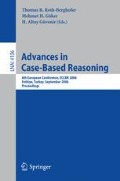Abstract
In this paper we propose a novel feature selection method able to handle concept drift problems in spam filtering domain. The proposed technique is applied to a previous successful instance-based reasoning e-mail filtering system called SpamHunting. Our achieved information criterion is based on several ideas extracted from the well-known information measure introduced by Shannon. We show how results obtained by our previous system in combination with the improved feature selection method outperforms classical machine learning techniques and other well-known lazy learning approaches. In order to evaluate the performance of all the analysed models, we employ two different corpus and six well-known metrics in various scenarios.
Access this chapter
Tax calculation will be finalised at checkout
Purchases are for personal use only
Preview
Unable to display preview. Download preview PDF.
References
Oard, D.W.: The state of the art in text filtering. User Modeling and User-Adapted Interaction 7, 141–178 (1997)
Wittel, G.L., Wu, S.F.: On Attacking Statistical Spam Filters. In: Proc. of the First Conference on E-mail and Anti-Spam CEAS (2004)
Androutsopoulos, I., Paliouras, G., Michelakis, E.: Learning to Filter Unsolicited Commercial E-Mail. Technical Report 2004/2, NCSR Demokritos (2004)
Delany, S.J., Cunningham, P., Coyle, L.: An Assessment of Case-base Reasoning for Spam Filtering. In: Proc. of Fifteenth Irish Conference on Artificial Intelligence and Cognitive Science: AICS 2004, pp. 9–18 (2004)
Cunningham, P., Nowlan, N., Delany, S.J., Haahr, M.: A Case-Based Approach to Spam Filtering that Can Track Concept Drift. In: Ashley, K.D., Bridge, D.G. (eds.) ICCBR 2003. LNCS, vol. 2689. Springer, Heidelberg (2003)
Fdez-Riverola, F., Iglesias, E.L., Díaz, F., Méndez, J.R., Corchado, J.M.: SpamHunting: An Instance-Based Reasoning System for Spam Labelling and Filtering. In: Decision Support Systems (to appear, 2006)
Sahami, M., Dumais, S., Heckerman, D., Horvitz, E.: A Bayesian approach to filtering junk e-mail. In: Learning for Text Categorization – Papers from the AAAI Workshop, Technical Report WS-98-05, pp. 55–62 (1998)
Carreras, X., Màrquez, L.: Boosting trees for anti-spam e-mail filtering. In: Proc. of the 4th International Conference on Recent Advances in Natural Language Processing, pp. 58–64 (2001)
Vapnik, V.: The Nature of Statistical Learning Theory, 2nd edn. Statistics for Engineering and Information Science (1999)
Lee, H., Ng, A.Y.: Spam Deobfuscation using a Hidden Markov Model. In: Proc. of the Second Conference on E-mail and Anti-Spam CEAS (2005)
Druker, H., Vapmik, V.: Support Vector Machines for Spam Categorization. IEEE Transactions on Neural Networks 10(5), 1048–1054 (1999)
Platt, J.: Fast training of Support Vector Machines using Sequential Minimal Optimization. In: Sholkopf, B., Burges, C., Smola, A. (eds.) Advances in Kernel Methods – Support Vector Learning, pp. 185–208. MIT Press, Cambridge (1999)
Schapire, R.E., Singer, Y.: BoosTexter: a boosting-based system for text categorization. Machine Learning 39(2/3), 135–168 (2000)
Rigoutsos, I., Huynh, T.: Chung-Kwei: a Pattern-discovery-based System for the Automatic Identification of Unsolicited E-mail Messages (SPAM). In: Proc. of the First Conference on E-mail and Anti-Spam CEAS (2004)
Graham, P.: Better Bayesian filtering. In: Proc. of the MIT Spam Conference (2003)
Hovold, J.: Naïve Bayes Spam Filtering Using Word-Position-Based Attributes. In: Proc. of the Second Conference on Email and Anti-Spam CEAS (2005), http://www.ceas.cc/papers-2005/144.pdf
Kolcz, A., Alspector, J.: SVM-based filtering of e-mail spam with content specific misclassification costs. In: Proc. of the ICDM Workshop on Text Mining (2001)
Gama, J., Castillo, G.: Adaptive Bayes. In: Garijo, F.J., Riquelme, J.-C., Toro, M. (eds.) IBERAMIA 2002. LNCS, vol. 2527, pp. 765–774. Springer, Heidelberg (2002)
Scholz, M., Klinkenberg, R.: An Ensemble Classifier for Drifting Concepts. In: Proc. of the Second International Workshop on Knowledge Discovery from Data Streams, pp. 53–64 (2005)
Syed, N.A., Liu, H., Sung, K.K.: Handling Concept Drifts in Incremental Learning with Support Vector Machines. In: Proc. of the fifth ACM SIGKDD international conference on knowledge discovery and data mining, pp. 317–321 (1999)
Widmer, G., Kubat, M.: Learning in the presence of concept drift and hidden contexts. Machine Learning 23(1), 69–101 (1996)
Lenz, M., Auriol, E., Manago, M.: Diagnosis and Decision Support. In: Lenz, M., Bartsch-Spörl, B., Burkhard, H.-D., Wess, S. (eds.) Case-Based Reasoning Technology. LNCS (LNAI), vol. 1400, pp. 51–90. Springer, Heidelberg (1998)
Yang, Y., Pedersen, J.O.: A comparative study on feature selection in text categorization. In: Proc. of the Fourteenth International Conference on Machine Learning ICML 1997, pp. 412–420 (1997)
Baeza-Yates, R., Ribeiro-Neto, B.: Modern Information Retrieval. Addison Wesley, Reading (1999)
Méndez, J.R., Iglesias, E.L., Fdez-Riverola, F., Díaz, F., Corchado, J.M.: Analyzing the Impact of Corpus Preprocessing on Anti-Spam Filtering Software. Research on Computing Science 17, 129–138 (2005)
Shannon, C.E.: The mathematical theory of communication. Bell Syst. Tech. J. 27, 379–423, 623–656 (1997)
Salton, G., McGill, M.: Introduction to mosdern information retrieval. McGraw-Hill, New York (1983)
Kohavi, R.: A study of cross-validation and bootstrap for accuracy estimation and model selection. In: Proceedings of the 14th International Joint Conference on Artificial Intelligence IJCAI 1995, pp. 1137–1143 (1995)
Oliver, J.J., Hand, D.J.: Averaging over decision stumps. In: Bergadano, F., De Raedt, L. (eds.) ECML 1994. LNCS, vol. 784, pp. 231–241. Springer, Heidelberg (1994)
Author information
Authors and Affiliations
Editor information
Editors and Affiliations
Rights and permissions
Copyright information
© 2006 Springer-Verlag Berlin Heidelberg
About this paper
Cite this paper
Méndez, J.R., Fdez-Riverola, F., Iglesias, E.L., Díaz, F., Corchado, J.M. (2006). Tracking Concept Drift at Feature Selection Stage in SpamHunting: An Anti-spam Instance-Based Reasoning System. In: Roth-Berghofer, T.R., Göker, M.H., Güvenir, H.A. (eds) Advances in Case-Based Reasoning. ECCBR 2006. Lecture Notes in Computer Science(), vol 4106. Springer, Berlin, Heidelberg. https://doi.org/10.1007/11805816_37
Download citation
DOI: https://doi.org/10.1007/11805816_37
Publisher Name: Springer, Berlin, Heidelberg
Print ISBN: 978-3-540-36843-4
Online ISBN: 978-3-540-36846-5
eBook Packages: Computer ScienceComputer Science (R0)

